| Listing 1 - 10 of 10 |
Sort by
|
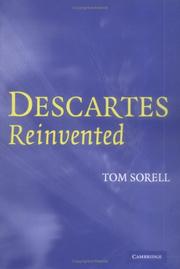
ISBN: 9780521851145 0521851149 9780511499289 0511130651 9780511130656 0511499280 1280422394 9781280422393 1107153913 9781107153912 0511182597 9780511182594 0511200277 9780511200274 0511300700 9780511300707 0511129122 9780511129124 Year: 2005 Publisher: Cambridge New York Cambridge University Press
Abstract | Keywords | Export | Availability | Bookmark
 Loading...
Loading...Choose an application
- Reference Manager
- EndNote
- RefWorks (Direct export to RefWorks)
In this study, Tom Sorell seeks to rehabilitate views that are often instantly dismissed in analytic philosophy. His book serves as a reinterpretation of Cartesianism and responds directly to the dislike of Descartes in contemporary philosophy. To identify what is defensible in Cartesianism, Sorell starts with a picture of unreconstructed Cartesianism, which is characterized as realistic, antisceptical but respectful of scepticism, rationalist, centered on the first person, dualist, and dubious of the comprehensiveness of natural science and its supposed independence of metaphysics. Bridging the gap between history of philosophy and analytic philosophy, Sorell also shows for the first time how some contemporary analytic philosophy is deeply Cartesian, despite its outward hostility to Cartesianism.
History of philosophy --- Descartes, René --- Descartes, René, --- Descartes, René, --- Descartes, Renatus --- Cartesius, Renatus --- Arts and Humanities --- Philosophy --- Descartes, Rene,
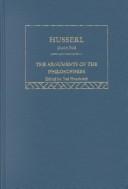
ISBN: 1135002053 1136957855 1282733141 9786612733147 0203849795 9780203849798 9780415203760 0415203767 9780415203920 0415203929 9781135002053 9781136957857 9781282733145 6612733144 0415203767 0415203929 9781136291685 1136291687 0415203589 9780415203586 129997712X 0415487625 1315008750 9781136957802 9781136957840 9780415487818 9781315008752 9781136291753 9781136291821 9780415487627 113629175X Year: 1999 Publisher: London New York Routledge
Abstract | Keywords | Export | Availability | Bookmark
 Loading...
Loading...Choose an application
- Reference Manager
- EndNote
- RefWorks (Direct export to RefWorks)
First Published in 1999. Routledge is an imprint of Taylor & Francis, an informa company.
Husserl, Edmund, --- Husserl, Edmund --- Husserl, Edmond --- Hobbes, Thomas, --- Hobbes, Thomas --- Gobbs, Tomas, --- Hobbs, Thomas, --- Gobbes, Tomas, --- T. H. --- H., T. --- Hobs, Thomas, --- Hobbes, --- Hobbes, Thom. --- Hobbius, Thomas, --- Hobbuzu, Tomasu, --- Huobusi, --- Hobbs, Tho. --- הובס, תומס, --- 霍布斯, --- ホッブズ, トマス,
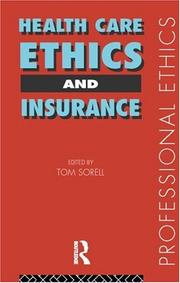
ISBN: 1134715099 0203274393 1280336862 020302124X 9786610336869 9780203274392 9780415162845 041516284X 9780415162852 0415162858 041516284X 0415162858 9780203021248 9781134715046 9781134715084 9781134715091 1134715080 Year: 1998 Publisher: London New York Routledge
Abstract | Keywords | Export | Availability | Bookmark
 Loading...
Loading...Choose an application
- Reference Manager
- EndNote
- RefWorks (Direct export to RefWorks)
This comprehensive and sometimes controversial book provides an essential survey of the key issues in health insurance. It is a valuable read for students and teachers of Business Studies as well as health professionals of all kinds.
Book
ISBN: 9781107360136 9781107044319 9781107621435 9781107417663 110741766X 1107360137 9781107421684 1107421683 1306072166 9781306072168 1107044316 1107621437 1107425743 1139893734 1107423414 1107420288 Year: 2013 Publisher: Cambridge : Cambridge University Press,
Abstract | Keywords | Export | Availability | Bookmark
 Loading...
Loading...Choose an application
- Reference Manager
- EndNote
- RefWorks (Direct export to RefWorks)
In this book Tom Sorell argues that emergencies can justify types of action that would normally be regarded as wrong. Beginning with the ethics of emergencies facing individuals, he explores the range of effective and legitimate private emergency response and its relation to public institutions, such as national governments. He develops a theory of the response of governments to public emergencies which indicates the possibility of a democratic politics that is liberal but that takes seriously threats to life and limb from public disorder, crime or terrorism. Informed by Hobbes, Schmitt and Walzer, but substantially different from them, the book widens the justification for recourse to normally forbidden measures, without resorting to illiberal politics. This book will interest students of politics, philosophy, international relations and law.
War and emergency powers --- Democracy. --- Liberalism. --- Rule of law. --- Supremacy of law --- Administrative law --- Constitutional law --- Liberal egalitarianism --- Liberty --- Political science --- Social sciences --- Self-government --- Equality --- Representative government and representation --- Republics --- Emergency powers --- War powers --- Delegation of powers --- Executive power --- Implied powers (Constitutional law) --- Legislative power --- War and emergency legislation --- War, Declaration of --- Philosophy. --- Hobbes, Thomas, --- Hobbes, Thomas --- Gobbs, Tomas, --- Hobbs, Thomas, --- Gobbes, Tomas, --- T. H. --- H., T. --- Hobs, Thomas, --- Hobbes, --- Hobbes, Thom. --- Hobbius, Thomas, --- Hobbuzu, Tomasu, --- Huobusi, --- Hobbs, Tho. --- הובס, תומס, --- 霍布斯, --- ホッブズ, トマス, --- Social Sciences --- Political Science
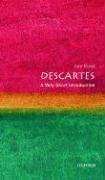
ISBN: 9780191540363 0191540366 1281769959 9781281769954 9786611769956 6611769951 9780191606564 0191606561 0192854097 9780192854094 Year: 2000 Publisher: Oxford New York Oxford University Press
Abstract | Keywords | Export | Availability | Bookmark
 Loading...
Loading...Choose an application
- Reference Manager
- EndNote
- RefWorks (Direct export to RefWorks)
In this book, Tom Sorell shows Descartes as an advocate and practitioner of a new mathematical approach to physics, and that he developed his metaphysics to support his programme in the sciences.
Science --- Philosophy --- History --- Descartes, René, --- Descartes, Renatus --- Cartesius, Renatus --- Descartes, Rene,
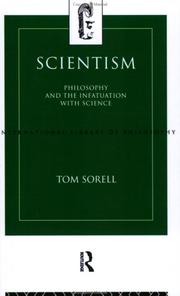
ISBN: 1134841221 0585455791 1280109793 9786610109791 0203426975 9780203426975 9780585455792 9780415107716 0415107717 9780415033992 0415033993 0415107717 0415033993 Year: 1991 Publisher: London Routledge
Abstract | Keywords | Export | Availability | Bookmark
 Loading...
Loading...Choose an application
- Reference Manager
- EndNote
- RefWorks (Direct export to RefWorks)
Sorrell is critical of the scientistic tendency in philosophy. He does not wish to devalue science but supports the need to raise the status of arts and humanities within the discipline.
Scientism. --- Philosophy and science. --- Scientism --- Philosophy and science --- History.
Book
ISBN: 1316397246 1316399443 1316400522 1316399982 1316398862 1316401065 1316275639 1107110971 1107527759 131639400X 9781316275634 9781316398869 9781107110977 9781316398326 1316398323 9781316400524 9781316399989 9781107527751 9781316397244 9781316399446 9781107110977 9781107527751 9781316401064 Year: 2015 Publisher: Cambridge : Cambridge University Press,
Abstract | Keywords | Export | Availability | Bookmark
 Loading...
Loading...Choose an application
- Reference Manager
- EndNote
- RefWorks (Direct export to RefWorks)
Microfinance - the practice of providing small loans to promote entrepreneurial activity among those with few financial assets - is increasingly seen as a sustainable means of aiding the global poor. Perhaps its most influential advocate, Nobel Laureate Muhammad Yunus, has claimed that there is a human right to microfinance, given its potential for poverty alleviation. This book directs critical philosophical attention at this very widely used and praised poverty-reducing measure. In chapters that discuss microfinance schemes and models around the world, internationally renowned contributors address important questions about both the positive impact of microfinance and cases of exploitation and repayment pressure. Exploring how far microfinance can or should be situated within broader concerns about justice, this volume sheds light on ethical issues that have so far received little systematic attention, and it advances discussion on new human rights, exploitation, and global justice.
Microfinance. --- Microfinance --- Micro-finance --- Microcredit --- Microenterprise lending --- Microlending --- Financial services industry --- Small business --- Finance --- Moral and ethical aspects.
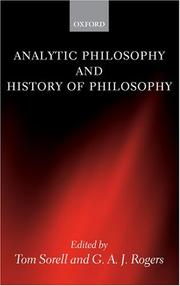
ISBN: 1280755407 9786610755400 0191557420 1423788737 9780191557422 9781423788737 9781280755408 0199278997 661075540X 1383042373 Year: 2005 Publisher: Oxford New York Clarendon Press Oxford University Press
Abstract | Keywords | Export | Availability | Bookmark
 Loading...
Loading...Choose an application
- Reference Manager
- EndNote
- RefWorks (Direct export to RefWorks)
Philosophy written in English is overwhelmingly analytic philosophy, & the techniques & predilections of analytic philosophy are not only unhistorical but anti-historical, and hostile to textual commentary. Ten philosophers explore the tensions between analytic philosophy & history of philosophy.
Analysis (Philosophy) --- Philosophy --- Analysis, Linguistic (Philosophy) --- Analysis, Logical --- Analysis, Philosophical --- Analytic philosophy --- Analytical philosophy --- Linguistic analysis (Philosophy) --- Logical analysis --- Philosophical analysis --- Philosophy, Analytical --- Language and languages --- Methodology --- Logical positivism --- Semantics (Philosophy) --- History.
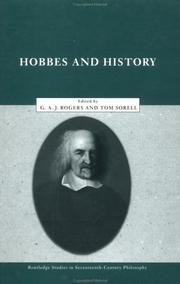
ISBN: 1280046635 0203464842 0203249216 9780203249215 9780203464847 9780415224444 0415224446 9781134591541 9781134591497 9781134591534 9780415648356 Year: 2000 Publisher: London New York Routledge
Abstract | Keywords | Export | Availability | Bookmark
 Loading...
Loading...Choose an application
- Reference Manager
- EndNote
- RefWorks (Direct export to RefWorks)
Much of Thomas Hobbes's work can be read as historical commentary, taking up questions in the philosophy of history and the rhetorical possibilities of written history. This collection of scholarly essays explores the relation of Hobbes's work to history as a branch of learning.
History --- History, Modern --- Philosophy. --- Philosophy --- Hobbes, Thomas, --- Hobbes, Thomas --- Gobbs, Tomas, --- Hobbs, Thomas, --- Gobbes, Tomas, --- T. H. --- H., T. --- Hobs, Thomas, --- Hobbes, --- Hobbes, Thom. --- Hobbius, Thomas, --- Hobbuzu, Tomasu, --- Huobusi, --- Hobbs, Tho. --- הובס, תומס, --- 霍布斯, --- ホッブズ, トマス,
Book
ISBN: 904813076X 9048130786 9048130778 9400730802 9786612839320 1282839322 Year: 2010 Publisher: Dordrecht, Netherlands ; New York, N.Y. : Springer Verlag,
Abstract | Keywords | Export | Availability | Bookmark
 Loading...
Loading...Choose an application
- Reference Manager
- EndNote
- RefWorks (Direct export to RefWorks)
Scientia is the term that early modern philosophers applied to a certain kind of demonstrative knowledge, the kind whose starting points were appropriate first principles. In pre-modern philosophy, too, scientia was the name for demonstrative knowledge from first principles. But pre-modern and early modern conceptions differ systematically from one another. This book offers a variety of glimpses of this difference by exploring the works of individual philosophers as well as philosophical movements and groupings of the period. Some of the figures are transitional, falling neatly on neither side of the allegiances usually marked by the scholastic/modern distinction. Among the philosophers whose views on scientia are surveyed are Hobbes, Descartes, Spinoza, Gassendi, Locke, and Jungius. The contributors are among the best-known and most influential historians of early modern philosophy.
Knowledge, Theory of. --- Science -- Philosophy. --- Science --- Knowledge, Theory of --- Philosophy --- Philosophy & Religion --- Philosophy. --- Epistemology --- Theory of knowledge --- Normal science --- Philosophy of science --- Cultural heritage. --- History. --- Modern philosophy. --- History of Philosophy. --- History of Science. --- Modern Philosophy. --- History, general. --- Cultural Heritage. --- Psychology --- Philosophy (General). --- Philosophy, modern. --- Cultural heritage --- Cultural patrimony --- Cultural resources --- Heritage property --- National heritage --- National patrimony --- National treasure --- Patrimony, Cultural --- Treasure, National --- Property --- World Heritage areas --- Modern philosophy --- Annals --- Auxiliary sciences of history --- Mental philosophy --- Humanities
| Listing 1 - 10 of 10 |
Sort by
|

 Search
Search Feedback
Feedback About UniCat
About UniCat  Help
Help News
News